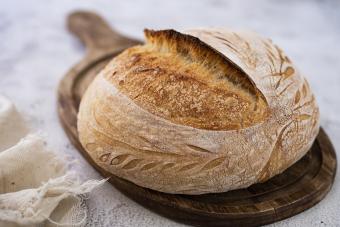
Buckwheat honey is a strong-flavored honey with a dark purple color that looks almost black. While many vegetarians consider raw honey to be a whole food staple in their diet, vegans choose not to eat honey because it is a predigested by-product of honey bees. For those who do eat honey, the health benefits are many.
Raw Vs. Processed Honey
Before we look specifically at buckwheat honey, it's important to address the difference between raw and processed honey. When honey is processed, it is heated to temperatures that reach 160 degrees. This is followed by a filtering process that takes out some of the very qualities which make honey a beneficial dietary supplement. This includes:
- Pollen
- Beeswax
- Enzymes
Not only are these and other qualities removed, but some bottlers actually add ingredients like corn syrup to lengthen the shelf life of the honey.
Raw honey is not cooked, and for true raw foodists what degree foods can be heated to and still be considered raw varies. Some won't eat anything that's been heated above 104, for others 116 is the cut off. This includes heat used in the bottling or extraction process. The problem is that some honey needs to heated to 120 if it has crystallized. Heating returns it to liquid form. Though this honey will crystallize again, it happens at a slower rate because it has been slightly heated.
About Buckwheat
Buckwheat is a popular plant with bee keepers because it of its plentiful flowers, but its production has gradually decreased over the years. A buckwheat field in full bloom appears to form a dense ground cover of white flowers, but in actuality each individual plant is rather gangly and awkward when lifted from the ground. Flowering starts around three weeks following planting and the dense fields of flowers provide a prolific source of nectar for honey bees. This thick carpet of flowers lasts for a few weeks and then tapers as the plant matures.
Benefits of Buckwheat Honey
Buckwheat honey's full-bodied flavor isn't for everyone, but once accustomed to it, some people fall in love with its lingering aftertaste. Its dark color and taste are reminiscent of molasses, and it's a favorite in Europe. Darker honey like this, is said to contain more antioxidants. Antioxidants provide a defense against free radicals, and are said to help fight heart disease, cancer, and other maladies. Buckwheat honey is also a great source of iron. Other benefits include:
- Higher in mineral content
- No fat or cholesterol
- Provides quick energy
- Can be stored without refrigeration
Studies and Research
University of California (Antioxidants)
This rich, dark honey has also been the focus of a number of studies. Research done at University of California, Davis concluded that eating honey boosts antioxidant levels. This was a small controlled study of 25 people who ate between four and ten tablespoons of buckwheat honey everyday for a month. The amount consumed was dependant on the individual's size. The honey could be eaten in whatever manner the participants wanted as long as it wasn't baked or dissolved in a hot liquid. The result was that antioxidant levels when up in all of the people participating. Researchers concluded that the honey had as many antioxidants as:
- Spinach
- Apples
- Strawberries
- Oranges
Another point that's worth mentioning regarding this study is that none of the people taking part in it gained weight during the study.
Penn State College of Medicine (For Coughs in Children)
Another study, this one conducted by Penn State College of Medicine, determined that small amounts of buckwheat honey administered before bedtime helped relieve nighttime coughing in children when compared to the cough suppressant dextromethorphan (DM). DM is no longer recommended for children age five and under because of its ineffectiveness and adverse side effects. The Penn State College of Medicine study determined that honey controlled not only the frequency of coughing but also the severity, and participants including adults and children experienced better quality of sleep.
How to Find Local Buckwheat Honey
Buckwheat honey is not a common honey and may be hard to find locally because it is produced mostly in the northern plains as an early summer crop. The long growing season available to Missouri lets farmers there grow buckwheat as a double crop following the wheat harvest. It is most commonly grown in:
- Minnesota
- Missouri
- New York
- Ohio
- Pennsylvania
- Wisconsin
- Eastern Canada
Another reason buckwheat honey is harder to find is that buckwheat itself is being planted less and less as a crop. To help find the market closest to you, the National Honey Board provides a convenient Honey Locator to help find suppliers in your vicinity. It is also available online.







